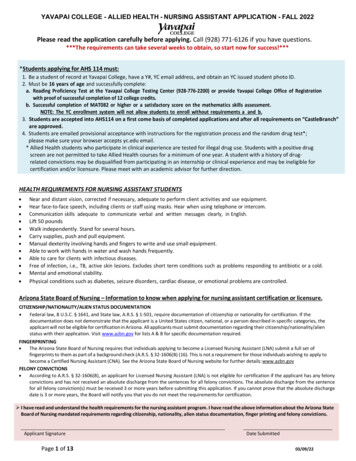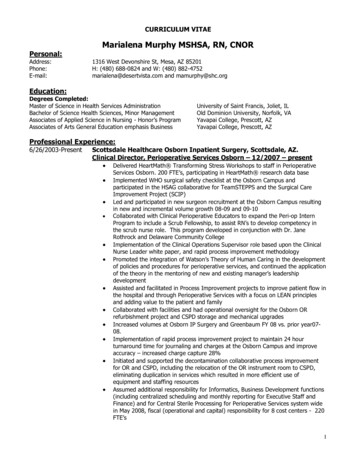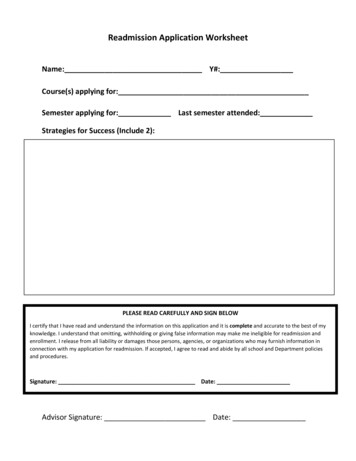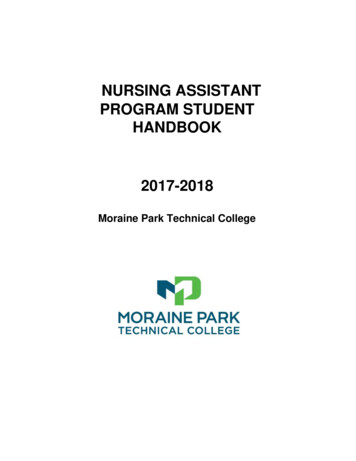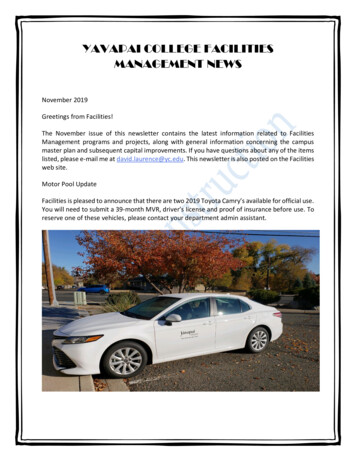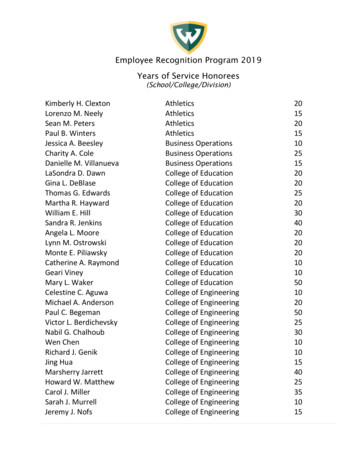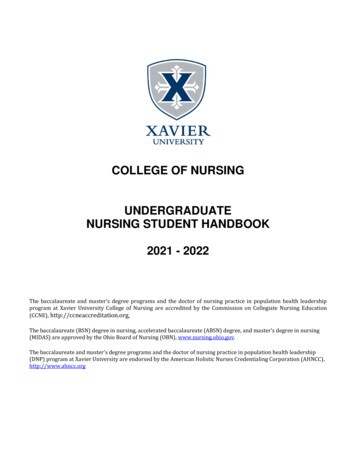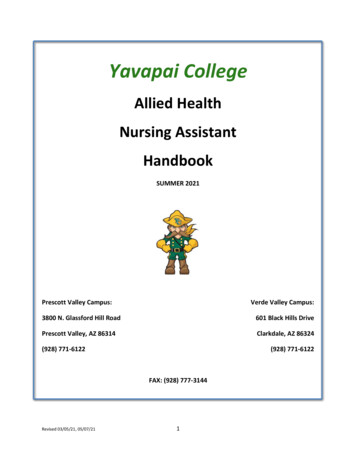
Transcription
Yavapai CollegeAllied HealthNursing AssistantHandbookSUMMER 2021Prescott Valley Campus:Verde Valley Campus:3800 N. Glassford Hill Road601 Black Hills DrivePrescott Valley, AZ 86314Clarkdale, AZ 86324(928) 771-6122(928) 771-6122FAX: (928) 777-3144Revised 03/05/21, 05/07/211
NURSING ASSISTANT HANDBOOKDescription of the Yavapai Community College Nursing Assistant ProgramThe Nursing Assistant training program at Yavapai Community College prepares students totake the State competency exams that lead towards certification as a nursing assistant. Theprogram fulfills Federal, State, and post-secondary requirements.The State Board of Nursing requires that students complete a minimum of 120 hours of trainingbefore taking the state certification/licensure exams. Students must spend a minimum of 60hours in lecture, 20 hours in skills lab, and a minimum of 40 hours in a clinical setting. Of the 40hours spent in clinical, a minimum of 20 hours must be spent in a long-term care facility.The duration of the program varies from 8 weeks to 16 weeks depending on which semester(fall, spring, or summer) the course is taught and the number of days per week and hours perday that students spend completing the course. The program schedule is posted on the collegewebsite and can be viewed at www.yc.edu. The college will follow the posted schedule unlessthere are unforeseen circumstances that warrant a change in the schedule (i.e., naturaldisaster, inclement weather, cancellation of clinical site) in which case the college will assurethat students are provided an opportunity to complete the required hours.Course DescriptionAHS 114. Nursing Assistant (5 credits). Preparation for the role of a nursing assistant in a longterm care facility. Basic nursing assistant skills and emergency procedures; client needs andrights; written and verbal communication; ethical and legal aspects; safety and infection control.Includes classroom and clinical instruction. Application required with the followingdocumentation: Skin test or chest X-ray negative for TB, or equivalent within 12 months; currentDPS fingerprint clearance card and CPR for the Healthcare Provider. Must be at least 16 yearsold. Prerequisite: Reading Proficiency and MAT 082 (or a satisfactory score on the mathematicsskills assessment). Four lecture. Three lab.Admission Requirements – Admission to AHS 114 Nursing Assistant is done through anapplication process. The application can be found at www.yc.edu/AlliedHealth.Reading and Math ProficiencyThe State Board of Nursing requires that nursing assistant students possess English language,reading, and math skills necessary to comprehend course materials and perform duties safely.Students may prove these proficiencies several ways: Successful completion of a minimum ofRevised 03/05/21, 05/07/212
12 college level courses (100 level or higher) with the grade of “C” or better; completion of acollege degree from an institution accredited by the Higher Learning Commission; or successfulscoring on reading and math proficiency exams. The reading and math proficiency exams areadministered via the Testing Center on our community college campus as well as many otheracademic sites. The Testing Center can be reached by calling 928-776-2200.The Allied Health Department does not have access to the content of any of the math orreading proficiency exams. The different exams that students may take to assess reading andmath proficiency and passing scores are listed on the Course Outline under “Prerequisites.”( YC Reading Proficiency Met Y or Credit level085 Minimum092 Minimum097 Minimum142 Minimum152 Minimum157 Minimum172 Minimum187 Minimum220 Minimum241 MinimumENG 083 Minimum Grade of C or Credit level ENGGrade of C) and (Credit level MAT 082 Minimum Grade of C or Credit level MATGrade of C or Credit level MAT 100 Minimum Grade of C or Credit level MATGrade of C or Credit level MAT 122 Minimum Grade of C or Credit level MATGrade of C or Credit level MAT 141 Minimum Grade of C or Credit level MATGrade of C or Credit level MAT 156 Minimum Grade of C or Credit level MATGrade of C or Credit level MAT 167 Minimum Grade of C or Credit level MATGrade of C or Credit level MAT 183 Minimum Grade of C or Credit level MATGrade of C or Credit level MAT 212 Minimum Grade of C or Credit level MATGrade of C or Credit level MAT 230 Minimum Grade of C or Credit level MATGrade of C or Credit level MAT 262 Minimum Grade of C or Accuplacer ElementaryAlgebra 25 or Acc NextGen QuantReasoning 220 or GED Mathematical Reasoning 150 or High SchoolGPA (Self-Report) 2.5 or Accuplacer Arithmetic 66) or Compass College Algebra 31)Revised 03/05/21, 05/07/213
Health Requirements, Technical Standards, and Other Program RequirementsHealthHealth Requirements:Certain functional abilities are essential for the delivery of safe, effective nursing care.These abilities are essential in the sense that they constitute core components of nursingassistant practice, and there is a high probability that negative consequences will resultfor patient/clients under the care of nursing assistants who fail to demonstrate theseabilities. A program preparing students for the practice of nursing assistant must attendto these essential functional abilities in the education and evaluation of its students.This statement of the Technical Standards of the nursing assistant program at YavapaiCollege identifies the functional abilities deemed by the allied health faculty to beessential to the practice of nursing assistants. Reference material used in thedevelopment of these standards include the Arizona Nurse Practice Act, The FunctionalAbilities Essential for the Delivery of Safe, Effective Nursing Care (a descriptive researchstudy conducted by the National Council of State Boards of Nursing), and CoreComponents and Competencies of ADN graduates (developed by the Council of AssociateDegree Nursing of the National League for Nursing). The Technical Standards are reflectedin the nursing assistant program’s performance-based outcomes, which are the basis forteaching and evaluating all nursing assistant students.Students with disabilities who think they may require accommodation in meeting theTechnical Standards of the nursing assistant course should contact the Office of DisabilityResources at Yavapai College (928-776-2085) to discuss the process of identifyingreasonable accommodations. Students should seek accommodation advising as soon aspossible so that a plan for accommodation can be in place at the beginning of theprogram. Reasonable accommodation will be directed toward providing an equaleducational opportunity for students with disabilities while adhering to the standards ofnursing assistant practice for all students.Technical StandardsThe practice of nursing assistant requires the following functional abilities with or withoutreasonable accommodations.a. Visual acuity sufficient to assess patients and their environments and to implementthe nursing care plans that are developed from such assessments.Examples of relevant activities:Revised 03/05/21, 05/07/214
Detect changes in skin color or condition.Collect data from recording equipment and measurement devices used in patientcare.Detect a fire in a patient area and initiate emergency action.b. Hearing ability sufficient to assess patients and their environments and to implementthe nursing care plans that are developed from such assessments.Examples of relevant activities: Detect sounds related to bodily functions using a stethoscope.Detect audible alarms within the frequency and volume ranges of the soundsgenerated by mechanical systems that monitor bodily functions.Communicate clearly in telephone conversations.Communicate effectively with patients and with other members of the health careteam.c. Olfactory ability sufficient to assess patients and to implement the nursing care plansthat are developed from such assessments.Examples of relevant activities: Detect foul odors of bodily fluids or spoiled foods.Detect smoke from burning materials.d. Tactile ability sufficient to assess patients and to implement the nursing care plansthat are developed from such assessments.Examples of relevant activities: Detect changes in skin temperature.Detect unsafe temperature levels in heat-producing devices used in patient care.e. Strength and mobility sufficient to perform patient care activities and emergencyprocedures.Examples of relevant activities: Safely transfer patients in and out of bedTurn and position patients as needed to prevent complications due to bed rest.Accurately read the volumes in body fluid collection devices hung below bed level.Perform cardiopulmonary resuscitation.f. Fine motor skills sufficient to perform psychomotor skills integral to patient care.Examples of relevant activities: Accurately place and maintain position of stethoscope for detecting sounds ofbodily functions.Revised 03/05/21, 05/07/215
g. Physical endurance sufficient to complete assigned periods of clinical practice.h. Ability to speak, comprehend, read, and write English at a level that meets the needfor accurate, clear, and effective communication.i.Emotional stability to function effectively under stress, to adapt to changingsituations, and to follow through on assigned patient care responsibilities.j.Cognitive ability to collect, analyze, and integrate information and knowledge tomake clinical judgments and manage decisions that promote positive patientoutcomes.TB Skin testEach student must provide documentation of a negative TB skin test (2-step), chest x-ray report,or other documentation that confirms the student does not have tuberculosis. This is a prerequisite to the class and a copy of this documentation must be submitted with the applicationfor AHS 114. Documentation must not expire during the length of the course.CPRThe student must provide a CPR card for the Health Care Provider. This is a pre-requisite to theclass and a copy of this documentation must be submitted with the application to AHS 114.Documentation must not expire during the length of the course. We do not accept online CPRcourses.Fingerprint ClearanceStudents must obtain a Fingerprint Clearance Card from the Arizona Department of Public Safety(DPS). This is a pre-requisite to the class and a copy of this documentation must be submittedwith the application to AHS 114. Documentation must not expire during the length of the course.Fingerprint clearance is required for enrollment in all Allied Health programs. Fingerprintclearance is required through agreements with the clinical agencies to place students for trainingpurposes. If there is a positive criminal history, a fingerprint clearance may be denied whichwould cause removal from the program until this can be cleared. The Fingerprint Clearance Cardcannot expire during any of the Allied Health programs. The DPS Fingerprint Clearance Cardrequired for the nursing assistant program course will not meet the requirements for licensurethrough the Arizona State Board of Nursing.Revised 03/05/21, 05/07/216
A student whose conduct results in the loss of fingerprint clearance will be dropped from thenursing assistant program and may reapply to the program once they can produce a validFingerprint Clearance Card.Urine Drug ScreenStudents must submit to a urine drug screen as part of the application process for the nursingassistant program. Students may also be tested “for cause” during the program itself. Pleaserefer to Appendix A of this handbook for a full explanation.AttendanceA minimum of 120 hours is required to pass this course (60 hours lecture, 20 hours skills lab and40 hours clinical). Each student’s attendance will be recorded daily by student signature. Missingmore than the allowable hours in any category will result in failure of the class regardless of testgrades. Please notify your instructor at least 60 minutes prior to the start of the class if you willbe absent or need to miss any amount of time from a class or clinical day. In the case of a clinicalabsence, you must call the clinical agency where you are assigned at least 60 minutes before thescheduled time to tell unit staff you will be absent. Make a note of the name of the person younotify. You must also notify your instructor at least 60 minutes prior to the start of the clinical.You must be on time the first day of class or you will be dropped from the class. Open positionswill be offered to students on the alternate list providing they are present and on time the firstday of class.Students missing time in the classroom, skills lab, or clinical area will only be granted “make-up”time in the event of an excused absence. Examples of excused absences are illness, accident, orinjury of the student; death of an immediate family member; inclement weather; or otherunforeseen events. Students may be required to provide documentation that aids in determiningwhether the absence is excused or not.If a student is allowed to make-up missed time, the student will be required to complete learningactivities that are equivalent to the missed curricular topics, clinical experiences, or skills lab inboth substance and in classroom or clinical time. Make-up time will be done under thesupervision of a qualified instructor and the scheduling of make-up time is dependent oninstructor availability.If the student chooses not to make-up missed time and does not meet the minimum hourlyrequirements of the program, the student will not pass the course.Revised 03/05/21, 05/07/217
GradingStudents must demonstrate satisfactory completion of all required skills and competencies andapply them safely and correctly while caring for clients/residents.1.Arizona State Board of Nursing Rule R4-19-801 requires students score a minimum 75%correct answers on a comprehensive secure final examination with no more than one re-take.2.A student may be allowed an additional re-take following documented, focusedremediation based on past test performance. Any re-take examination must contain differentitems than the failed exam, address all course competencies, and be documented with score,date administered and proctor in the student record. (Arizona State Board of Nursing Rule R419-801 requires a 75% on a comprehensive theoretical exam.) Further grading criteria isaddressed in the course syllabus.3.Students must demonstrate, to program faculty, satisfactory performance of eachpractical skill as prescribed in the curriculum before performance of that skill on patients orresidents without the instructor’s presence, direct observation, and supervision.4.The course grade is based on theoretical examinations. Skills labs and clinicals are gradedpass/fail. Students must pass classroom, skills lab, and clinical components of the course toreceive a passing grade in the course.Clinical DeficienciesWhen areas of deficiency are identified, the instructor may initiate a written contract thatincludes a statement of the deficiencies, ways to demonstrate achievement of course objectives/outcomes, time limit for demonstration of improvement, and the consequences if the studentdoes not improve satisfactorily.Professional Appearance:Instructors have the prerogative of not allowing a student to participate in the clinical experienceif uniform guidelines are not met.The purpose of the uniform and dress policy is to maintain acceptable standards of grooming andclient/student safety. Appearance is a direct reflection of feelings about self and others. One'scredibility as a teacher of healthful practices and as a provider of care may be directly influencedby appearance and observed behaviors. As students, you will be representatives of the YavapaiCollege Department of Allied Health in the clinical agencies. You will be assessed, in part, by yourdress and grooming. The Allied Health dress code is similar to the codes of clinical agencies.Students must follow guidelines of assigned agencies.Revised 03/05/21, 05/07/218
General Uniform Guidelines:1. Dress for hospital/extended care facility.a. Students must wear clean, neat, properly fitting 2-pocket pullover scrub tops anduniform pants in the color specified for the program.b. Shoes: white or black, closed toe and secure heel (closed or strap), leather or vinyluppers, low rubber heal. Shoes and shoelaces color are to match and be clean.c. Socks: Clean socks must match the shoe color or neutral hose must be worn. Ifskirts are worn, legs must be covered with nude or white stockings (no visible barelegs).d. A watch with a second hand and personal stethoscopes are required.e. All documentation will be done in black ballpoint pen.f. Student name tags must be worn with clips attaching the name tag to the collar.g. Students must also wear any identification required by the clinical facility.h. Lanyards are not allowed as they may swing forward and interfere with patientcare.i. Uniforms are not to be worn outside of clinical areas to minimize the spread ofpathogens.j. White lab coats may be worn over uniforms if appropriate. Sweaters are notpermitted. Students may wear a long-sleeved T-shirt, in a neutral color (black,white, or same color as uniform) under their scrub top.2. Dress for out-of-hospital assignments is included in the guidelines for that clinicalexperience. No shorts, mini-skirts, low-cut tops etc.3. Standardsa. Acceptable jewelry is limited to a watch as required, small earrings (one per ear),small chain necklace. Married students may wear a wedding band. Students withpierced ears may wear small post earrings which are not distracting or dangling.Small chain necklaces should be kept under the uniform. Rings with large stonesmay not be worn. Nose rings, eyebrow rings and similar jewelry are potentiallydangerous. They must be removed or covered with a Band-Aid. Gauges must beremoved and replaced with a clear plug. Tongue studs/rings interfere withcommunication and may not be worn to a clinical setting.b. Tattoos may be considered offensive or inappropriate and must be covered.c. No gum chewing.d. Personal hygiene.i. Bathing and use of unscented deodorant before arriving in clinical agenciesis required.ii. Perfume, after shave and other fragrant products may not be worn inclinical settings. They are potentially harmful to people with respiratorydisease, allergies, nausea, and other health problems.iii. Hair: must be well-groomed, clean, and controlled, and off-the-collar. Hairmust be of a natural color (not pink, blue, purple etc.); unconventionalhairstyles are not permissible. Moustaches and beards must be clean,well-groomed, and trimmed short.Revised 03/05/21, 05/07/219
iv. Make-up should be unobtrusive and used in moderation.v. No artificial nails are permitted. Fingernails will be kept short and wellmanicured. Pale and neutral nail polish may be worn if not chipped orcracked. Nail polish is prohibited in operating rooms and labor anddelivery area.e. Some hospital departments such as OB and OR have stricter requirements whichthe student will have to meet during those rotations.Circumstances Which May Lead to Immediate Dismissal of a Student includes the following:1.2.3.4.5.6.7.8.9.10.11.12.Performing any task that is not within the student’s scope of practice.Absences accrued, in accordance with attendance policy above.Dishonesty, including, but not limited to stealing from the College or a clinical agency,plagiarism of papers, cheating on examinations, unauthorized possession of examination,etc.Unprofessional conduct:examples including but not limited to violations ofconfidentiality; failure to show respect for client or their significant others, peers, odeofconduct.htmFailure to improve unsatisfactory clinical performance after counseling.Performance or negligence which may cause physical or emotional jeopardy to a client.Failure to report immediately a client care error to the clinical instructor and/orresponsible staff nursing personnel.Being under the influence of alcoholic beverages, drugs which impair judgment, or illegaldrugs while in the clinical setting. (See Appendix A: Suspicion of Substance Abuse)Fraudulent or untruthful charting in a medical record.Failure to pass skills lab checkoffs.Failure to maintain appropriate behaviors already demonstrated or learned, withconsistency, while incorporating new skills and theory.Failure to perform safely may lead to immediate removal from clinical assignments witha grade a grade of “F” or “U” at the discretion of the instructor.Process for Dismissal1. Student is informed of dismissal by the appropriate instructor(s).2. Student signs instructor’s written report of the significant events, attaching a statementif desired.3. Student may request a hearing with the instructor and Allied Health Director.4. Student may appeal the grade by following the process outlined in the Yavapai CollegeGeneral Catalog.Revised 03/05/21, 05/07/2110
Students’ Rights and ResponsibilitiesThe student is responsible for attending and participating in all class activities and for meetingthe course learning outcomes. The student is also responsible for maintaining standards of carein the clinical agencies. Additional Rights and Responsibilities are addressed in the YavapaiCollege General Catalog at http://www.yc.edu/academics.Student Code of ConductRespect for the rights of others and for the College and its property are fundamental expectationsfor every student. The Student Code of Conduct outlines behavioral expectations and explainsthe process for responding to allegations of student misconduct.Students are expected to respond and write in a professional and appropriate manner whenactivities are assigned to create scenarios, discuss opinions, present on a selected subject, or postto the web board. Inappropriate language or objectionable material will not be tolerated andcould result in disciplinary measures and/or a failing grade for the class.Academic and Non-Academic ComplaintsFor issues within the Allied Health Department:1. Attempt to solve the issue with the instructor of the course.2. If this does not resolve the problem, discuss the problem with the Allied Health ProgramDirector.3. If the issue is still not resolved, the Division Dean will serve as an arbitrator.A student may appeal an academic or instructional decision by faculty if s/he deems the decisionto be made in error. The appeal must be made in a timely manner in accordance with ctional-support/complaints.htmlGrievance Policy Based on Discrimination, Harassment, Sexual Misconduct or RetaliationYavapai College is committed to maintaining a college environment which is free fromdiscrimination or harassment in violation of the law or College Policy. The College AntiDiscrimination Policy prohibits discrimination on the basis of sex, race, color, age, national origin,religion, sexual orientation, disability, veteran status, or gender identity. See Policy 10.06 AntiDiscrimination.Revised 03/05/21, 05/07/2111
Any individual in the College community, including applicants, employees, students, and guests,may file a grievance alleging discrimination, harassment, or retaliation for reportingdiscrimination or harassment as described below. Grievances concerning allegations of thisbehavior will follow the grievance resolution process. This process may also be used to addressincidents of sexual misconduct as defined in Policy 10.14 Sexual Harassment (Title IX). Individualsreporting sexual misconduct may also contact police or if it is an emergency, dial 911.The College encourages students and employees to report incidents of discrimination,harassment, or retaliation as soon as possible, by contacting the individual below.MAKE REPORTS TO:Title IX Coordinator / Human Resources DirectorMonica Belknap, J.D. (or successor)Yavapai College1100 E. Sheldon Street, Prescott, AZ 86301(928) 776-2211Monica.belknap@yc.eduThis policy can be found on the Yavapai College /1000d/1005-grievance.pdfStudent EvaluationsThe Yavapai Community College nursing assistant program shall provide each student with anopportunity to anonymously and confidentially evaluate the course instructor, curriculum,classroom environment, clinical instructor, clinical setting, textbook, and resources of theprogram.Disabilities1. All students must meet the requirements for passing theoretical examinations, performingrequired skills, and providing safe care to clients/residents. A student who has a physical orlearning disability is encouraged to discuss their situation with the instructor. Ifaccommodations are requested for a documented disability, the student must contact theCollege Disabilities Resource office (928-776-2085).2. In some cases, such as pregnancy or a temporary health problem, the instructor may requesta statement from a health care provider (MD, DO, nurse practitioner, nurse midwife, orphysician’s assistant) regarding the student’s condition and any limitations in the clinical area.Revised 03/05/21, 05/07/2112
Student Fees and Financial AidCurrent tuition and fees are identified in the Yavapai College Schedule of Classes 1.htmlVisit www.yc.edu/alliedhealth for a list of costs associated with AHS114 Nursing Assistant.Students seeking financial aid should contact the Financial Aid office on the Prescott or VerdeValley campus (928-776-2152).Affirmative Action/Equal Employment OpportunityYavapai College is an affirmative action/equal opportunity institution. For Yavapai College’snondiscrimination statement, visit www.yc.edu/aa-eeo. A lack of English language skills will notbe a barrier to admission and participation in the Career and Technical (vocational) educationprograms of the college.Arizona State Board of Nursing RequirementsWhen the student has successfully passed the nursing assistant training program at YavapaiCollege, they may apply for certification with the Arizona State Board of Nursing. (See AppendixB).CITIZENSHIP/NATIONALITY/ALIEN STATUS DOCUMENTATIONFederal law, 8 U.S.C. § 1641, and State law, A.R.S. § 1-501, require documentation of citizenshipor nationality for certification. If the documentation does not demonstrate that the applicant isa United States citizen, national, or a person described in specific categories, the applicant willnot be eligible for certification in Arizona. All applicants must submit documentation regardingtheir citizenship/nationality/alien status with their application. See attached list A & B for specificdocumentation required.FINGERPRINTINGThe Arizona State Board of Nursing requires that individuals applying to become a LicensedNursing Assistant (LNA) submit a full set of fingerprints to them as part of a background check.This is not a requirement for those individuals wishing to apply to become a Certified NursingAssistant (CNA). See the Arizona State Board of Nursing website for further details:www.azbn.gov.Revised 03/05/21, 05/07/2113
FELONY CONVICTIONSAccording to A.R.S. § 32-1606(B), an applicant for Licensed Nursing Assistant (LNA) is not eligiblefor licensure if the applicant has any felony convictions and has not received an absolutedischarge from the sentences for all felony convictions. The absolute discharge from thesentence for all felony convictions must be received 3 or more years before submitting thisapplication. If you cannot prove that the absolute discharge date is 3 or more years, the Boardwill notify you that you do not meet the requirements for licensure.Instructor supervision of students in the clinical areaEach clinical group will have a qualified RN instructor and no more than 10 students.A qualified RN instructor shall supervise any student who provides care to patients of residentsby:1. Remaining in the clinical facility and focusing attention on student learning needs duringall student clinical experiences.2. Providing the instructor’s current and valid contact information to students and facilitystaff during the instructor’s schedule teaching periods.3. Observing each student performing tasks taught in the training program.4. Documenting each student’s performance each day, consistent with course skills andclinical objectives.5. During the clinical session, engaging exclusively in activities related to the supervision ofstudents; and6. Reviewing all student documentation.Record MaintenanceThe following program records are maintained either electronically or in paper form in theAdministrative Offices of the Allied Health department for a minimum period of three years.1. Curriculum and course schedule for each cohort group.2. Results of state-approved written and manual skills testing.Revised 03/05/21, 05/07/2114
3. Completed student program evaluation forms, a summary of the evaluations for eachcohort group, and measures taken by the program, if any, to improve the program basedon student and instructor evaluation.4. A copy of any Board reports, applications, or correspondence, related to the program.5. A copy of all clinical contracts.The following student records are maintained electronically or in paper form in theAdministrative Offices of the Allied Health department for a minimum of three years.1. A record of each student’s legal name, date of birth, address, telephone number, emailaddress and social security number, if available.1. A completed skills checklist containing documentation of student level of competencyperforming the skills in R4-19-802(F) for nursing assistant.2. An accurate attendance record, which describes any make-up class sessions and reflectswhether the student completed the required number of hours in the course.3. Scores on each test, quiz, or exam and, if applicable, whether such test, quiz or exam wasretaken.4. A copy of the program certificate of completion, i
The Nursing Assistant training program at Yavapai Community College prepares students to take the State competency exams that lead towards certification as a nursing assistant. The program fulfills Federal, State, and post-secondary requirements. The State Board of Nursing requires that students complete a minimum of 120 hours of training
